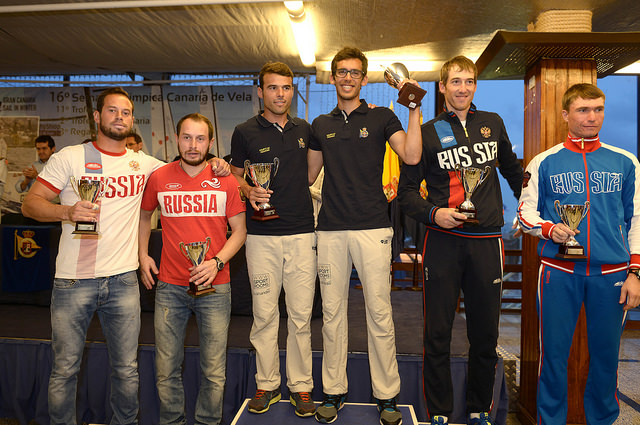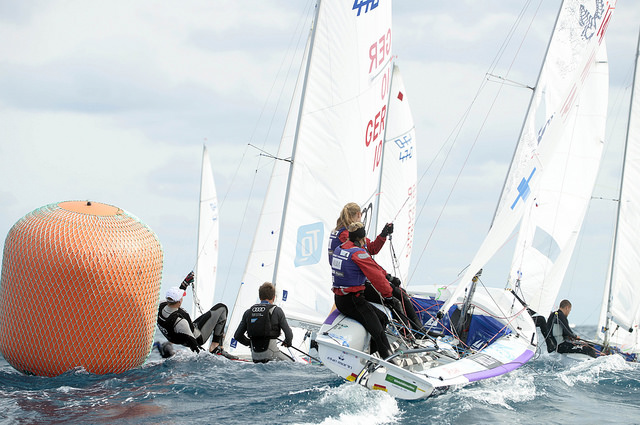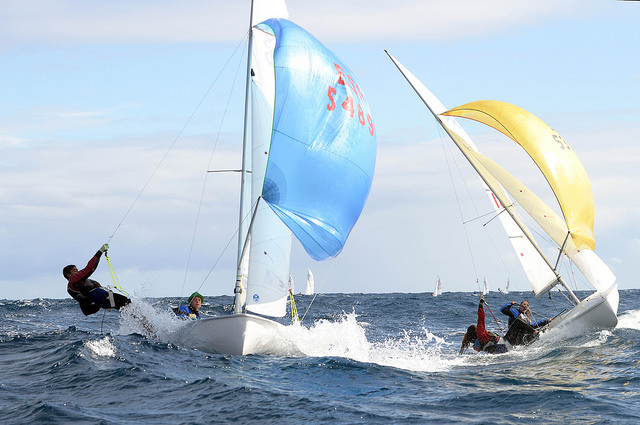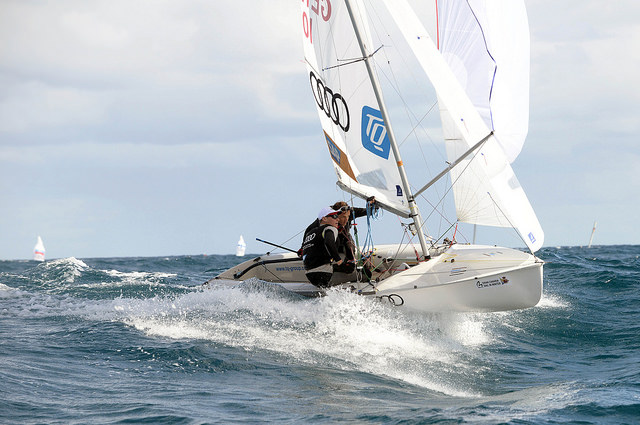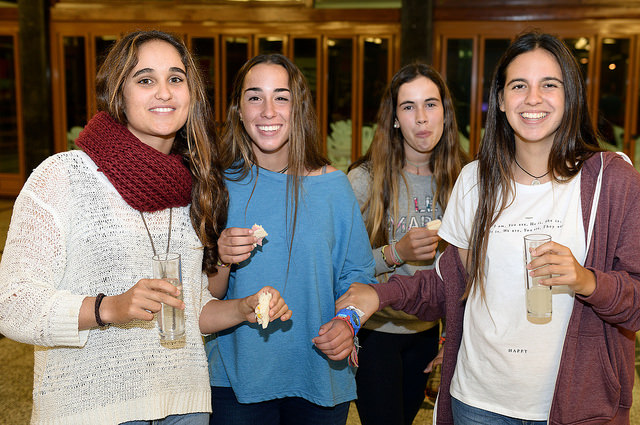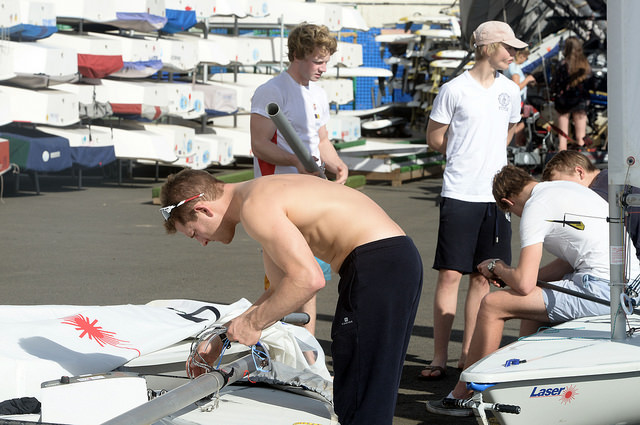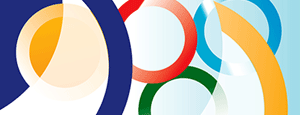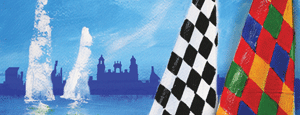Catalonian sailor Nacho Dávila, from Club Náutico Vilassar de Mar, has won the 29th International Optimist AECIO Trophy (Trofeo Internacional AECIO Ciudad de Las Palmas de Gran Canaria) after a brilliant performance. Dávila won four of the six races in the regatta, in which local sailor Yoel Hernández, from Real Club Náutico de Gran Canaria, took the silver medal in a close battle for second place among various competitors. Third place on the podium goes to Mariona Rahola, who’s also from Catalonia and is a member of Club Náutic El Balis.
After a day without sailing because of a lack of wind, three heats were held today, although not without a few hitches due to the variable weather conditions. Today’s shifting wind varied in intensity from five to seven knots, while the sea had few waves.
In these conditions, the first race started an hour late and the course for the third and final race had to be changed.
The award ceremony was attended by the City Councillor for Ciudad de Mar (Sea City), Mimi González; Sports Councillor, Carlos Ester; the head of the naval dockyard, Juan González Aller; the head of Gando Air Base, Jorge Clavero; and the board of the host club, led by the president, Óscar Bergasa, and the commodore, Matías Gómez.
Also present at the ceremony were the president of the Canary Islands Sailing Federation, Joaquín Blanco; the president of the Gran Canaria Sailing Federation, Alejandro Barrera; Carlos Torrado, president of the Spanish Optimist Federation; and Alejandro de Juan, Canary Islands representative of the Federation.
The support of the City Hall (Ayuntamiento de Las Palmas de Gran Canaria) and the Island Council (Cabildo de Gran Canaria) was essential for the holding of this event, which is now in its 29th year. This year the trophy was the inaugural regatta for the recently created Canary Islands Optimist Series (Circuito de Optimist Canario – COC), an initiative of the Canary Islands Sailing Federation aimed at fostering Optimist sailing in the Islands.
The international trophy, organised by Real Club Náutico de Gran Canaria, is also the first regatta of the Optimist Excellence Cup 2014-15.
Translate from Spanish by Jane McGrath

A lack of wind prevented the start of the races scheduled for Sunday, the second day of the 29th International Optimist AECIO Trophy (Trofeo Internacional AECIO Ciudad de Las Palmas de Gran Canaria), in which 150 Optimist sailors from various European countries, the Canary Islands and other parts of Spain are taking part.
The starting gun was sounded on two occasions, but racing had to be postponed both times. For Monday 29 December, three heats are scheduled, to be followed by the awards ceremony.
The provisional classification remains the same as at the end of Saturday’s racing.
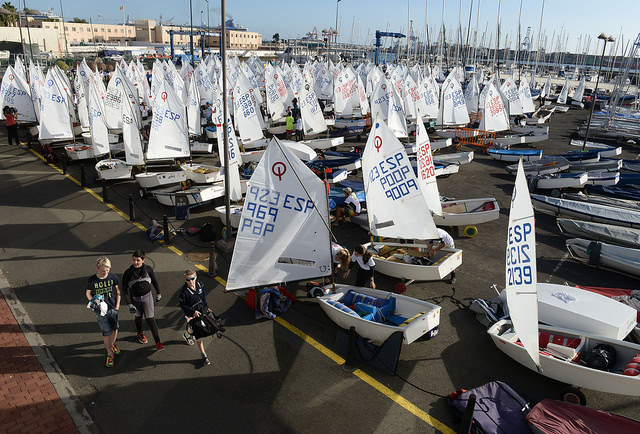
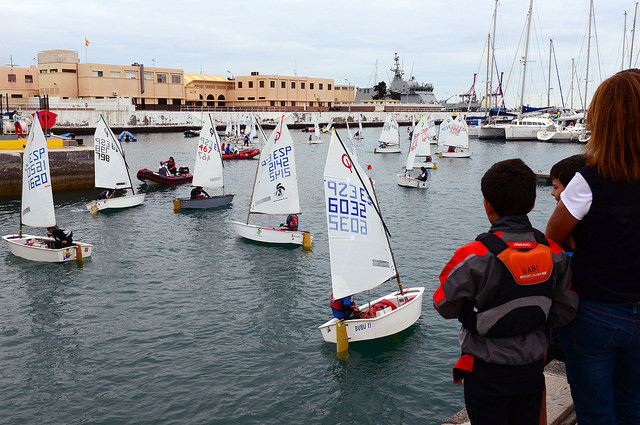 Nearly 200 Optimist sailors from Spanish regions and abroad will be battling it out this weekend in the 29th International Optimist AECIO Trophy (Trofeo Internacional AECIO Regata Ciudad de Las Palmas de Gran Canaria).
Nearly 200 Optimist sailors from Spanish regions and abroad will be battling it out this weekend in the 29th International Optimist AECIO Trophy (Trofeo Internacional AECIO Regata Ciudad de Las Palmas de Gran Canaria).
Organised by Real Club Náutico de Gran Canaria and sponsored by Las Palmas de Gran Canaria City Hall and the Gran Canaria Cabildo, this is the first race in the newly created Canary Islands Optimist Series and the inaugural race for the Optimist Excellence Cup 2014-2015.
The Cup will be held from 26-29 December and is the second event on the Gran Canaria Sail in Winter programme, a series of races that combines competition and entertainment and makes RCNGC and the city a winter sailing base for European sailing.
An increase in the number of representatives from Spanish regional sailing federations is a reflection of the rising popularity of the Canary Islands regatta, which will be a barometer of the state of this class in Spain. Some of Spain’s top Optimist sailors will be at the Gran Canaria trophy.
Some 50 competitors in this year’s race are from other Spanish regions or overseas. The competitors on the harbour of Las Palmas de Gran Canaria this weekend will be from Sweden, Russia, the United Kingdom and Morocco, and as well as the sailors from the Canary Islands, other parts of Spain will be represented, including Galicia, Cantabria, Catalonia, the Balearic Islands, Murcia, Valencia and Alicante.
Optimist is the class for beginner sailors. At Real Club Náutico de Gran Canaria alone, 120 children aged seven to 14 sail in this class.
The AECIO trophy (Asociación Española de la Clase Internacional Optimist – Spanish International Optimist Class Association) was created 29 years ago as a farewell race for children who’d reached the upper age limit in the Optimist class. The rules allow children to compete in Optimist until 31 December the year they turn 15. This means that competitors who’ve already started sailing in other classes can be racing for the trophy.
RCNGC sailors in this situation include Luis Doreste and Julio Alonso, who’ve already made their debut in 420 with a third place at the Spanish Under 16 Championship; Patricia Reino, European champion in team racing two seasons ago; and Álvaro del Busto and Álvaro Valido, who are already sailing in Laser 4.7 and have taken part in their first Spanish cup.
The competition will be tough at this year’s AECIO Trophy. The host club team will have to contend with Rubén Naranjo, who was 6th out of 355 sailors at the Ciudad de Palma race; Joel Hernández, second placegetter at the Semana Atlántico, held in Vigo two months ago; and other top sailors such as Samuel Beneyto, Eduardo Ojeda, Alberto Medina and Patricia Reino.
The winner’s name will be engraved on a plaque that he or she will keep for the year. In 2013 this honour went to RCNGC sailor Álvaro del Busto, who’s saying goodbye to the Optimist class this year.
The regatta:
The fleet will be divided into two groups each day, to allow all sailors to compete against each other. The groups will be changed every day according to the previous day’s classifications. Three races a day are scheduled, making a total of nine races.
On December 26 the competitors will be officially welcomed at an event in the afternoon, following an official training regatta at 14.00 hours.
The competition starts on December 27 at 12.00 hours. Races will start at 11.00 hours on the other two days.
Translated from Spanish by Jane McGrath

European Region of International Laser Class Association (EurILCA) has chosen Real Club Náutico de Gran Canaria as the venue for its European Laser Standard Senior Championship 2016.
This is the second international Laser class event awarded to the club in a short period of time. From 13 to 15 February 2015, RCNGC will be hosting the first regatta on the Europa Cup calendar, as its “Regata Internacional de Carnival – Ciudad de Las Palmas de Gran Canaria” has joined the series for the first time. This event is part of the Gran Canaria Sail in Winter programme, which makes the island’s capital city a focus for international dinghy sailing every winter.
The decision on the European Senior Championship 2016 was made in Paris at the association’s annual general meeting, which was attended by representatives from Germany, Poland, Israel, Switzerland, Greece, Norway, Sweden, Italy, the United Kingdom, Ireland, Portugal, France, Holland, Belgium, Rumania, Austria, Croatia and Hungary.
The AGM was held at the headquarters of the French Laser Class Association on 7 and 8 December, the same weekend RCNGC hosted its 16th Semana Olímpica Canaria de Vela.
The European Senior Championship 2016 in Las Palmas de Gran Canaria is particularly important because 2016 is an Olympic year. The final two places in this class for the Rio Olympics could be decided in Gran Canaria, although this is yet to be confirmed.
Real Club Náutico de Gran Canaria is strong in Laser, the world’s most popular sailing dinghy.
The current ISAF youth world champions in the boys’ and girls’ categories, Joel Rodríguez and Martina Reino, belong to the RCNGC sailing team. They’re both Spanish champions and Rodríguez is also European youth world champion and winner of the ILCA youth worlds.
Other team members include Joaquín Blanco, outstanding Laser Standard champion of the 16th Semana Olímpica Canaria de Vela; Ismael Iess, runner up in the Laser 4.7 world championship in Japan this summer; Kevin Cabrera; Luis Cabrera; María Cabrera; Yolanda Luque; María José Marichal; and Ivo Marrero, current Canary Islands 4.7 champion and fifth in the latest Spanish championship.
The size of the sail defines the category in the Laser class. The 4.7 has the smallest sail and is a beginner’s boat. After that is the Radial, the Olympic class for girls and the youth class for boys. The men’s Olympic boat is the Laser Standard, which has the largest sail.
Translated from Spanish by Jane McGrath
Real Club Náutico de Gran Canaria has taken the gold in the three premier classes of the 16th Semana Olímpica Canaria de Vela: Onán Barreiros and Juan Curbelo in 470, Joaquín Blanco in Laser Standard, and Kevin Cabrera in Laser Radial. In the new Paralympic class, the gold went to RCNGC sailor José Guerra, who’s about to embark on a challenge that will take him to 15 regattas throughout continental Europe in 2015.
Sailors from 23 countries have taken part in the 16th Semana Olímpica Canaria de Vela, the first event on the new Spanish Olympic series. Spanish Royal Sailing Federation President, José Ángel Rodríguez Santos, and pre-Olympic team manager, Tony Ripoll, travelled to Las Palmas de Gran Canaria to attend the competition.
The participation of representatives from 23 countries was one of the strong points stressed by Mimi González, City Councillor for Ciudad de Mar (Sea City). She said that Las Palmas de Gran Canaria City Council, one of the main supporters of this project, values the way the presence of these young sailors and their coaches and the ripple effect of the social networks help to promote the city as a tourism destination.
Sailing on the final day of this year’s Canary Islands Olympic Sailing Week was once again characterised by strong wind and sea conditions, which allowed all the scheduled races to be run on time.
Joaquín Blanco (RCNGC) has been one of the key figures in the competition. He’s a member of the Spanish Pre-Olympic team, which dominated the field from start to finish. Blanco barely stepped down from the podium. “Today conditions were very stable and that allowed me to secure the victory. A home win is always very special”, he said.
In 470, Onán Barreiros and Juan Curbelo (RCNGC), eighth in the international ranking, are ending the year with a victory they fought the two Russian crews for right up to the last minute. The Russians took second and third spot on the podium.
In the women’s 470, the win went to Mallorca’s Marina Gallego and Fátima Reyes. Russians Alisa Kirilyuk and Lyudmila Dmitrieva came second and the bronze went to Spain’s Ángela Pumariega (Asturias) and her crew member, Gran Canarian Patricia Cantero (RCNGC).
Kevin Cabrera, from RCNGC, took the gold in Laser Radial after a very even battle with Holland’s Benjamin Wempe. Third place went to another member of the RCNGC team, Luis Cabrera, one of the three sailors distinguished at this event by the Spanish Olympic Committee. During the Canary Islands Olympic Sailing Week award ceremony, Cabrera, Gustavo Martín and Patricia Reino received the medals awarded last year by the Spanish Olympic Committee in recognition of their sports achievements.
In the women’s Laser Radial, Lithuanian Viktorija Andrulyte had a strong win. Martina Reino, an RCNGC youth sailor, took the bronze medal. The silver went to Poland’s Agata Barwinska.
Races were held in three categories of board sailing. In RS:X 9.5, Club de Vela Formentera led the field, with Joan Cardona first and Sergio Escandell third. Second place went to Holland’s Matthijs Van’t Hoff.
In the women’s RSX:8.5, the victory went to Pilar Lamadrid, from Club Puerto Sherry (Cádiz), ahead of her two Dutch rivals.
In RS:X 8.5 junior, the Dutch took first and second place, leaving the bronze for Ángel Granda, from RCNGC.
The Olympic Sailing Week closed with the invitation to the 420 class, which included local competitors. The final placings were Elías Aretz/Elio Hoyos (1st), Wichy Hernández /Guillermo López (2nd) and María Caba/Carla Díaz (3rd).
F18 and Nacra 17 were dominated by the Germans.
The award ceremony was held this afternoon.
Translated from Spanish by Jane McGrath
Just four points separate two crews fighting for first place in the 470 class of the 16th Canary Islands Olympic Sailing Week, due to end on Monday in Las Palmas de Gran Canaria’s harbour. Russians Pavel Sozykin and Denis Gribanov lead the race with 22 points, closely followed by Onán Barreiros and Juan Curbelo, from the Real Club Náutico de Gran Canaria sailing team, on 26 points.
Real Club Náutico de Gran Canaria is the organiser of this 16th Olympic Sailing Week, which has brought 200 sailors from 24 countries to the bay in Las Palmas de Gran Canaria. Las Palmas City Hall (Ayuntamiento de Las Palmas), Cabildo de Gran Canaria and private companies Anfi and Naviera Armas are backing the event.
The weather conditions have played a starring role in the first three days of racing. The sea and wind conditions have been very favourable and all the races scheduled have been held. The weather’s expected to remain the same for the fourth and final day tomorrow. Contestants faced 6-10 knot northeast winds today, with some shifts and a swell without strong waves.
Another Russian crew, formed by the Sheremetyev brothers, is just three points behind Barreiros and Curbelo, increasing the tension for Monday’s final.
Back on shore, the Gran Canarian sailors explained they’d suffered “too many shifts in the wind” and had problems with the second close hauls in the two races on this third day of sailing.
In the women’s 470, the Spanish crew of Marina Gallego (Club Náutico La Rápita) and Fátima Reyes (Club Náutico Arenal) moved up to first place. Spain’s Angela Pumariega, from Asturias, and crew member Patricia Cantero, from Gran Canaria (RCNGC), are holding onto second place.
Cantero explained that after the first close haul in the first race, the wind shifts had been tough on them, but in the second heat the wind had let up and things went a lot better.
The considerable Russian presence in this competition, as seen both in the results and the number of contestants, is due to coach Mikhail Zabolotnov’s conviction that “Real Club Náutico de Gran Canaria is the best club in Europe”, as he told television company Panorama Vela. The company has brought a team of professionals to the island to make programmes about the competition for Spanish and international audiences.
In Laser Standard, Joaquín Blanco is not only holding the lead after six races, but is also facing the final day 12 points ahead of his closest rival, Holland’s Yuri Hummel. World youth champion, Joel Rodríguez (RCNGC), is fighting from fifth place.
As in the men’s 470, the difference is minimal in the top places in Laser Radial. Holland’s Benjamín Wempe is just one point ahead of Kevin Cabrera, from Real Club Náutico de Gran Canaria. In third place is Lithuanian Viktoria Andrulyte, who took two firsts on Sunday.
Racing has finished in the Paralympic class, with a victory for local sailor José Guerra, who won seven of the nine races held, taking the victory from his Finnish and French rivals.
In RS:X 9.5 the lead has gone to Joan Cardona, from the Balearic Islands, who’s two points ahead of Holland’s Matthis Van’t Half. The final could go either way.
The Dutch continue to lead in RS:X 8.5. They’re closely followed by Ángel Granda, from RCNGC, who’ll be starting the last day in third place in the overall classification.
In 420, the guest class, the lead has changed. Elías Aretz and Helenio Hoyos (RCNGC) are first equal on 22 points with María Caba/Carla Díaz. Wichy Hernández and Guillermo López have dropped to third place after a penalty for a false start.
Translated from Spanish by Jane McGrath
Monday is the last day. Two races are scheduled for each class. Trophies will be awarded at around 17.00 hours, depending on how the day at sea goes.
Canary Islanders Onán Barreiros and Juan Curbelo climbed to second place in the men’s 470 class on Saturday, the second day of the 16th Semana Olímpica Canaria de Vela, organised by Real Club Náutico de Gran Canaria in the bay of Las Palmas de Gran Canaria.
Two hundred sailors from 24 countries are competing until Monday in the harbour of the island’s capital city.
The Gran Canarian sailors, who are currently eighth in the international ranking, took two firsts and a ninth in Saturday’s three races. The overall classification in this class is headed by Russians Pavel Sozykin and Denis Gribanov, tenth placegetters at the Olympic class World Championship Santander 2014 with a second, a first and a third.
“We started off with a fantastic wind, lots of waves and sun – something you appreciate, especially at this time of year; in those conditions we won the first race”, said Barreiros back on shore.
The Gran Canarian sailor said that in the second regatta he fell into the water at the start and although they fought back, a bad choice in the second haul was responsible for the results.
“The squalls made the race area pretty complicated and although we won the third race, it was hard work”, he said.
The lead in the women’s 470 was taken by Russian crew Alisa Kirilyuk and Lyudmila Dmitrieva, currently in the world’s top 10 in this class. They were followed by the Spanish crew of Ángela Pumariega, from Asturias, and Patricia Cantero, from Gran Canaria.
Pumariega admitted she hadn’t been able to read the race area well due to changes in pressure and the gusts of wind and rain that hit the area throughout the morning.
RCNGC sailor Joaquín Blanco holds his lead in the Laser Standard Olympic class. Only one race was held on Saturday because of the weather conditions, which were characterised by constantly shifting winds, changes in pressure and squalls.
Spanish sailor Jesús Rogel, from Alicante, pushed his placing up to third in the overall classification, after Germany’s Tobías Schadewaldt. World Youth Champion Joel Rodríguez, from Real Club Náutico de Gran Canaria, is holding onto fourth place.
Benjamin Wempe continues to lead in Laser Radial, despite coming fourth on Saturday in the only race held in this class. Alejandro Pérez, from RCN de Tenerife, is in second place and Lanzarote’s Kevin Cabrera is third. Cabrera, a member of the RCNGC team, has won two of the three races held so far, and with the possibility of a discard tomorrow, he’s headed for first place.
Lithuanian Milda Eidukeviciute is dominating the women’s category and is fifth in the overall classification. The first Spanish woman is María Cabrera, in sixth place in the women’s category.
José Guerra, from the RCNGC team, is leading in the Paralympic class for the second day in a row. In board sailing, Spain’s Joan Cardona, from Club de Vela Formentera, is battling it out with Holland’s Matthis Van’t Half. The two sailors are sitting on 7 points each after three RS:X 9.5 regattas.
In the youth RS:X 8.5, the Dutch continue to rule, with Sam Wennekes in first place and Sil Hoekstra coming second. Ángel Granda, from RCNGC, is third, and Pilar Lamadrid, from Club de Mar Puerto Sherry, is third in the girl’s category.
The first regattas in the guest class (420) started on Saturday. The RCNGC crew of Wichy Hernández and Guillermo López is in the lead after three races.
The Nacra 17 and F 18 classes belong to the Germans.
For Sunday, the second to last day of racing, better wind conditions are expected.
Translated from Spanish by Jane McGrath 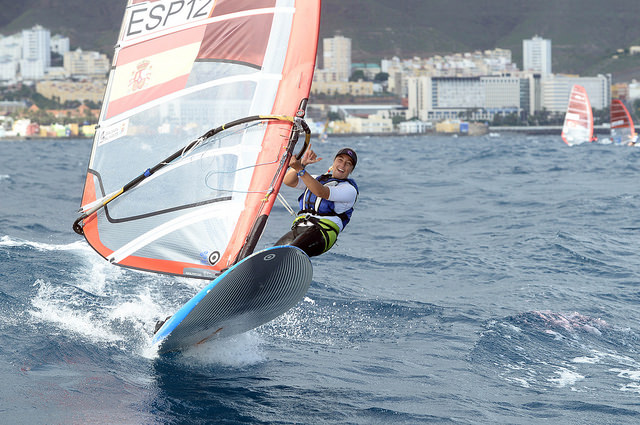
German sailors Ferdinand Gerz and Oliver Szymanski head the overall classification in the men’s 470 class after the first day of the 16th Semana Olímpica Canaria de Vela. The Canary Islands Olympic Sailing Week started on Friday in the bay of Las Palmas de Gran Canaria and is organised by Real Club Náutico de Gran Canaria.
With unbeatable weather conditions, winds of 15 to 20 knots increasing at the end of the morning and a 2 metre long wave, racing was under way in 470, Laser Standard and Laser Radial, RS:X 9.5 and 8.5, Nacra17, F-18 and the 2.4mR Paralympic class, which is included in this competition for the first time.
Laser Standard is led by local sailor Joaquín Blanco, who had a first and a sixth place in the two regattas held today.
Dutch sailor Benjamin Wempe has a two-second lead in the two Laser Radial heats raced today and is followed by five Spanish sailors.
Ecki and Tine-Marie Kaphengst are in the lead in Nacra 17, Joan C Cardona (Spain) took two firsts and a second in RS:X 9.5, giving him the overall lead, and the provisional leader in RS:X 8.5 is Holland’s Sam Wennekes.
The host club’s newly created Paralympic team heads the competition in 2.4mR: José Guerra took three firsts and Javier Ugarte took a fourth, a third and a second.
The 16th Canary Islands Olympic Sailing Week includes 215 sailors representing 24 countries, with a total of 165 boats. The entire Russian team is present (both the pre-Olympics and the youth team); Portugal has brought its Laser and 470 pre-Olympic teams; and Spain’s men’s and women’s 470, Laser Standard and women’s Laser Radial pre-Olympic teams are participating. Lithuania is represented by its Laser Standard and women’s Laser Radial pre-Olympic teams. Youth sailors from around 20 countries are also battling it out in various classes.
Translated from Spanih by Jane McGrath
 The 16th Semana Olímpica Canaria de Vela had its official start on Thursday, when participants were welcomed by local authorities. Two hundred sailors from 23 countries will start racing on Friday with the promise of “very good winds”, in the words of Canary Islands Sailing Federation Chairman, Joaquín Blanco Roca.
The 16th Semana Olímpica Canaria de Vela had its official start on Thursday, when participants were welcomed by local authorities. Two hundred sailors from 23 countries will start racing on Friday with the promise of “very good winds”, in the words of Canary Islands Sailing Federation Chairman, Joaquín Blanco Roca.
Like the other authorities who took part in the short event, Óscar Bergasa, President of Real Club Náutico de Gran Canaria, welcomed competitors by wishing them an enjoyable stay in Gran Canaria, saying he hoped they would enjoy the island’s gentle climate and the excellent conditions of the race area in Las Palmas de Gran Canaria.
Mimi González, Councillor for Ciudad del Mar (Sea City), is one of the most closely involved participants in this Real Club Náutico de Gran Canaria project, as it is part of her political mandate and she was also an Olympic sailor. González said she was very proud of this competition, the Canary Islands’ most important dinghy sailing event.
Alejandro Barrera (Chairman of the Gran Canaria Island Sailing Federation), Carlos Ester (Las Palmas de Gran Canaria Sports Councillor), and RCNGC Commodore, Matías Gómez, also took part in the welcome ceremony.
The Semana Olímpica Canaria de Vela starts on Friday and finishes on Monday 8 December. It is sponsored by the Ayuntamiento de Las Palmas de Gran Canaria (City Council) and the Cabildo de Gran Canaria, as well as private companies ANFI and Naviera Armas.
Translated from spanish by Jane McGrath
Decisions will start to be made about the Spanish pre-Olympic team in Gran Canaria this weekend during the 16th Semana Olímpica Canaria de Vela. A total of 162 boats from 23 countries (mostly European) are racing in the Canary Islands’ most important dinghy sailing event.
In the men’s 470, RCNGC crew Onán Barreiros and Juan Curbelo, just back from their excellent performance in the Sailing World Cup Final in Abu Dhabi after taking the bronze medal in Qingdao (China), are among the favourites in a high profile event. Barreiros (Spanish competitor at the last two Olympics) and Curbelo are 8th in the current International Sailing Federation (ISAF) rankings.
The race profile also includes Catalonian sailors Jordi Xammar and Joan Herp, who are the current World and European Youth champions, seventh placegetters at Sailing World Cup Santander and gold medal winners at Sailing World Cup Qingdao (China).
Other competitors include Russian sailors Pavel Sozykin and Denis Gribanov (10th in the Olympic class Sailing World Cup Santander 2014), the German Olympic team, and Russians Mikhail Sheremetyev and Maxim Sheremetyev, who represented their country at the last two Olympics.
One of the local competitors is Onán Barreiros, who has Olympic experience and an Olympic diploma. The women’s section also includes competitors from the Canary Islands. RCNGC sailor Patricia Cantero crews with Austurian sailor Ángela Pumariega, gold medal winner in match racing at the 2012 London Olympics.
In the 470 class, six countries are competing: Finland, Germany, Portugal, Russia, Spain and Turkey.
The Laser Standard Olympic class has the highest number of competitors, with 47 boats and sailors from 16 countries. Both quality and quantity can be found at this Canary Islands regatta. Several sailors who’ve already earned a place on their national teams for the Rio Olympics will be taking part, along with two host club competitors who’ll also be in the limelight: experienced sailor Joaquín Blanco and youth sailor Joel Rodríguez. Joel had a spectacular summer competing in the youth category in Laser Radial, winning one European and two world championships.
The focus is also on Poland’s Jonasz Stelmaszyk and Marcin Rudawski, Laser Radial Worlds champion and runner-up. In the Canary Islands, Stelmaszyk is competing in Laser Standard (the Olympic Laser class for men) and Rudawski is competing in Laser Radial.
In the women’s Laser Radial (the women’s Olympic Laser category) the complete winners’ podium from the last Under 21 championship, held in Douarnenez (France), will be racing: Agata Barwinska (Poland), Daphne Van der Vaart (Holland) and Real Club Náutico sailor Martina Reino. Martina, who won the ISAF Youth Worlds in Portugal this summer, is one of the host club’s trump cards.
The 2.4mR class (Paralympic) is making its début during the Canary Islands Olympic Sailing Week. It will also be a first for the new RCNGC team, comprising José Guerra (second in the Spanish series this year) and Javier Ugarte. The Canary Islanders will be competing against four Finnish sailors.
Five countries will be racing in the RS:X class (sail boards) and competition in the catamarans (Nacra and Formula 18) will be between the Germans and Austrians.
Translated from Spanish by Jane McGrath


